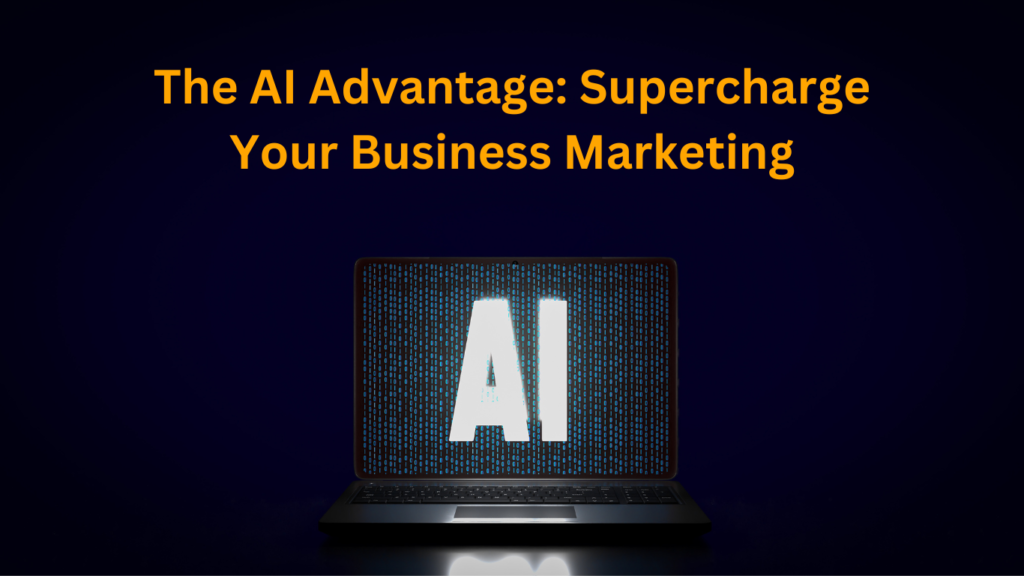The AI Advantage: Supercharge Your Business Marketing

Introduction
Artificial Intelligence (AI) has revolutionized various industries, including marketing. This article explores the impact of AI on marketing, its increasing importance for businesses, and how it can supercharge their marketing efforts.
Understanding AI in Marketing
Defining AI in Marketing
AI in marketing refers to the utilization of intelligent technology to automate various marketing processes and enhance their effectiveness. Key elements and components of AI in marketing include machine learning algorithms, natural language processing, data analytics, and predictive modeling. Unlike traditional marketing approaches, AI leverages advanced technologies to optimize marketing strategies and provide personalized experiences to customers.
The Role of AI in Marketing Strategies
AI plays a crucial role in modern marketing strategies by enabling businesses to effectively segment and target audiences. It helps in automating personalized content creation and delivery, saving time and resources. Additionally, AI-powered chatbots and virtual assistants enhance customer experience by quickly addressing queries and providing relevant information.
Leveraging AI for Data-driven Marketing
Collecting and Analyzing Data with AI
AI technology enables businesses to gather valuable customer insights and preferences by analyzing vast amounts of data. Utilizing AI algorithms improves the efficiency and accuracy of data analysis, leading to better decision-making.
Predictive Analytics and AI-driven Decision Making
By leveraging AI, businesses can forecast customer behavior and trends, allowing them to make data-driven marketing decisions. AI models help in predicting outcomes and identifying opportunities for enhanced campaign performance.
AI-Powered Marketing Automation
Enhancing Marketing Automation through AI
AI automates repetitive marketing tasks, streamlining workflows and reducing human error. This allows businesses to focus on strategic initiatives while benefiting from efficient lead generation and nurturing.
AI-powered Campaign Optimization and Performance Tracking
Marketing campaigns can be optimized using AI algorithms, ensuring that resources are allocated effectively. AI analytics tools track and measure marketing performance, providing valuable insights for future improvements.
AI and Social Media Marketing
AI-driven Social Media Analytics
AI is instrumental in social listening and sentiment analysis, enabling businesses to understand customer preferences and sentiments. It also helps enhance social media targeting and optimize ad campaigns for better results.
Creating Engaging Content with AI
AI-powered tools generate and curate content tailored to meet customer preferences, fostering engagement and driving conversions. Social media content can be personalized using AI technology, ensuring relevance and resonating with target audiences.
AI and Search Engine Optimization (SEO)
Improving Website Rankings with AI
AI algorithms assist in keyword research and optimization, enabling businesses to improve their website rankings. AI tools enhance both on-page and off-page SEO strategies, boosting visibility and organic traffic.
AI-powered Voice and Image Search Optimization
Businesses can optimize their website content for voice search using AI technology. Additionally, AI enhances visual search capabilities, ensuring accurate and relevant results for users.
AI and Customer Relationship Management (CRM)
Personalization and AI-driven Customer Experience
AI enables businesses to deliver highly personalized customer experiences at scale. By leveraging AI-powered chatbots, businesses can enhance customer interactions, providing quick and relevant responses.
AI in Customer Retention and Loyalty Programs
AI helps identify and retain high-value customers by analyzing behavior and preferences. Loyalty programs can be enhanced with AI-driven rewards and recommendations, fostering customer loyalty and satisfaction.
Challenges and Limitations of AI in Marketing
Ethical Considerations in AI Marketing
To ensure responsible AI usage, businesses must prioritize transparency and ethical practices. Addressing concerns about data privacy and security is crucial for building trust with customers.
Overcoming Implementation Barriers and Costs
Implementing AI in marketing comes with certain challenges, such as integration and adoption. Businesses need to navigate these barriers and consider budgeting and cost considerations for successful AI implementation.
Future Trends and Opportunities in AI Marketing
AI-powered Voice Assistants and Chatbots
Voice-activated devices are becoming increasingly significant in marketing. Businesses can leverage AI-powered voice assistants to engage in personalized conversations with customers, providing tailored solutions and recommendations.
AI in Augmented and Virtual Reality Marketing
Incorporating AI technology into immersive marketing experiences opens doors for enhanced customer engagement. AI-powered Augmented Reality (AR) and Virtual Reality (VR) offer interactive and personalized experiences, captivating audiences and driving conversions.
Summary: Unleashing the Power of AI in Marketing
AI has become a game-changer in the marketing industry, empowering businesses to streamline processes, improve targeting, and enhance customer experiences. By harnessing AI technologies, businesses can unlock new opportunities and achieve remarkable results in their marketing efforts.
FAQs (Frequently Asked Questions)
- What skills are required to implement AI in marketing?
- Proficiency in data analytics and AI technologies
- Understanding of marketing strategies and objectives
- How does AI benefit small businesses in marketing?
- Enables automation of tasks, saving time and resources
- Improves personalization and customer targeting for better outcomes
- Is AI marketing limited to large organizations?
- No, AI marketing can be beneficial for businesses of all sizes
- AI technologies are scalable and adaptable to various budgets
- What are the potential risks associated with AI in marketing?
- Concerns over data privacy and security
- The need for ethical usage and transparent practices
- How can businesses stay updated with evolving AI trends in marketing?
- Regularly engage in industry research and attend relevant conferences/webinars
- Collaborate with AI experts and stay connected with AI communities
